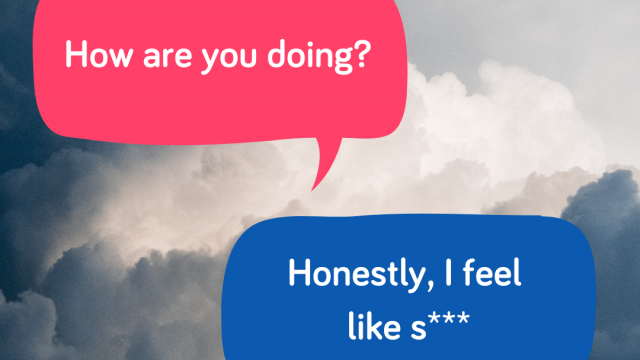Can I tell you a secret? I really struggle with Time to Talk day. Don’t get me wrong, I think it’s an important campaign that keeps us thinking about mental health and how it impacts everyone. But for me it can feel like a short term fix to a long term problem. Who’s checking in on the 364 other days of the year? What happens when well-meaning people get fed-up when their friend’s in their third crisis of the year?
For the uninitiated, Time to Talk is a campaign run by Mind and Rethink Mental Illness. Their aim is to get people to talk about mental health and create caring communities that check in on one another.
They’re right: talking about mental health is important. But personally, as someone who has struggled with a number of mental health diagnoses since I was a child, talking has its limits. I reread Ruth Durkin’s story ‘I’m Fine Thanks’ that we published at the end of last year. I remembered how many likes and shares it got on social media and how it seemed to resonate with so many people in the community. It made me wonder whether some of you might feel similarly to me.
So, I thought I’d chip into the conversation with some of my own tips for what has helped when I have been in crisis, or supported the people I love in a crisis. This is not an exhaustive list, and I would really love to hear what has helped you connect with friends when you’re at your lowest.
Meet us where we are
And that can mean in our depression pit, with stacks of takeaway around the stinking duvet we haven’t crawled out from under in a week. That can mean someone talking very fast and not making a lot of sense. It can mean self-harm scars or hallucinations or intense anger or shame.
I’m not asking you to let go of your boundaries or put yourself in a space that makes you unsafe, I mean work with where we are. Be ready to hear we feel awful or to talk about things that are ‘detached from reality’. Be ready to speak to us when we haven’t showered for goodness knows how long. If you know your friend is really struggling with their anger, arrange to speak to them on the phone or by video call if you’re worried about them lashing out at you. Which leads me onto the next tip…
Be prepared to feel uncomfortable
Mental health gets ugly and messy. No one is their best self when they’re at their lowest. Maybe you’ll get an apology later down the line after your sister screamed at you because she was in a trauma flashback. Maybe you won’t. Either way, learning to sit with that discomfort is going to be important if you plan to stick around.
Shame is a horrible companion. Anyone with mental illness, and especially the kind that makes them ‘erratic’ or ‘difficult,’ is dealing with it every day. Your feelings matter too, of course they do. But if you really want to show us you’re here for the long haul you will do your best to not make us feel ashamed for the things we have no control over.
Be honest
Especially about your limitations and boundaries. Write them down so you know what they are. Work out a plan with us for what you’re going to do if we breach them or if you’re not available. Don’t make promises you can’t keep. This is a relationship based on trust and especially when you’re supporting someone with a history of trauma and abuse, that trust can be hard to gain and easy to break. Don’t set yourself up for failure by making blanket promises like ‘I’ll always be there’ – you’re human, what if you get sick, or you’re unavailable, or just too exhausted to support? Honesty allows everyone to prepare for days when no one has the capacity to be there.
Do your research
Particularly if you’re supporting a loved one with a more stigmatised condition, such as psychosis or a personality disorder. Mind’s website has a ton of resources about different mental health problems and related topics. This will help you to know what to expect and it will mean the person you’re supporting won’t have to explain details about their condition that they’re probably tired of rehashing.
That being said, we’re all individuals so please don’t be afraid to ask us questions. Ask us what has helped in the past, if there are any grounding techniques we find useful, or anything we find triggering.
Solidarity can be better than solutions
You’re not a superhero. You’re not going to single handedly solve poverty or institutional racism or the endless waiting lists or any of the big picture problems that we’re facing. While it’s really important to have a broad understanding of the social factors that impact mental health (and maybe even join a campaign to tackle these wider inequalities!), sometimes all you can do is acknowledge that it’s really hard out there and give people space to be critical about the NHS and other services they’re dealing with.
On the other end of the spectrum, sometimes the answer to a problem can seem super simple to you – surely this person would feel better if I cleaned their house for them or I phoned this service for them. While you can always ask, be prepared to respect peoples ‘no’s. Lots of people with long term mental health conditions have experienced being on a ward or being sectioned or otherwise having their liberty taken from them. Sure, if someone is refusing their medication or you think they’re a danger to themselves or others, then you should speak to a professional engaged in their care. But as much as possible, respect their autonomy. People have the right to make decisions you think are ‘bad’ or ‘silly’, and yes, that includes mad people.
It’s not a one-day job
Perhaps this is my biggest gripe with all awareness days. If you love someone with a mental health condition, you are in it for the long haul. Some of us might aim for recovery. For some of us, that isn’t even an option, or our definition of recovery might be very different to your average sane person.
Burnout is real and the best way to avoid this is to work out your support network. Sit with the person you’re supporting, map out who they trust. Map out who you trust and who is going to support you. Contact your local Carers Centre (because if you’re providing long-term support to someone with a mental health condition, you are a carer doing unpaid care) to see how they can support you. Consider contacting IAPT or speaking to your GP or engaging a private counsellor because this kind of support can really take its toll.
My experiences are far from universal. I would love to see the conversation continue in the comments – what interventions have made a meaningful impact when you’re really struggling? What do you think about Time to Talk, and awareness days in general?



